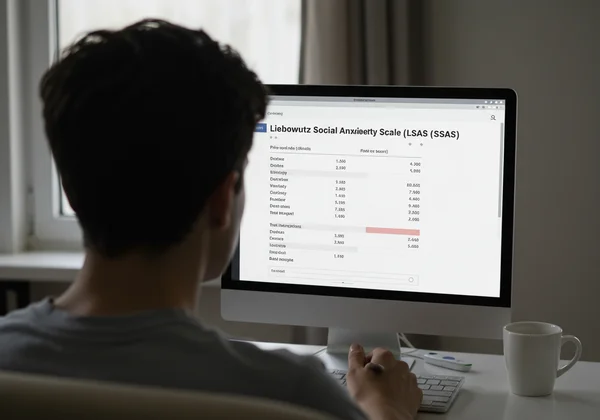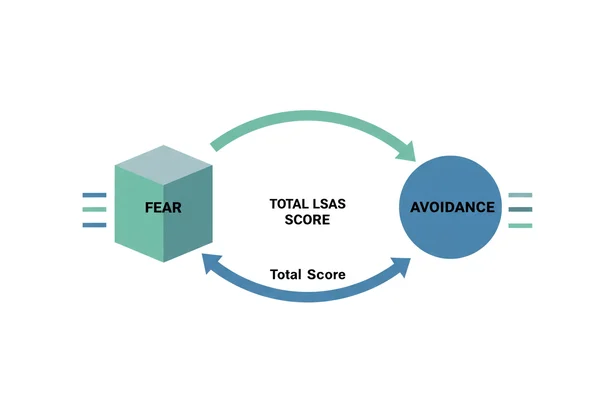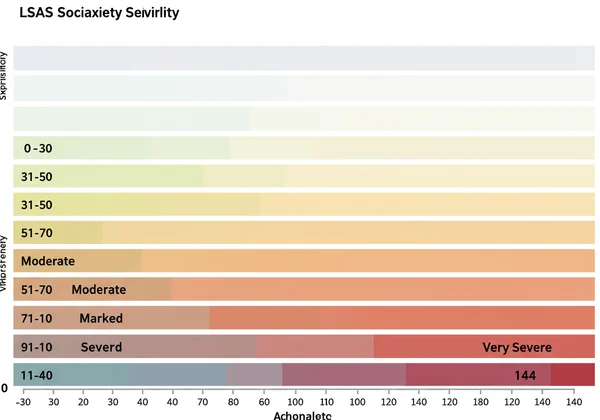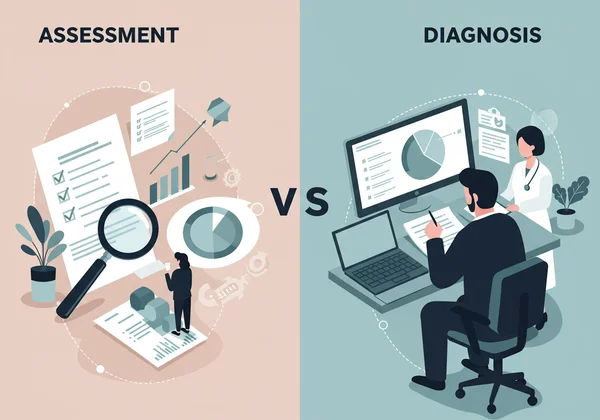LSAS 점수 의미: 사회 불안 수준 이해하기
July 13, 2025 | By Elara Donovan
Liebowitz Social Anxiety Scale (LSAS) 검사를 완료하고 점수를 받으셨을 것입니다. 그런데 그 숫자가 여러분의 사회적 편안함과 잠재적인 사회 불안에 대해 정확히 무엇을 말해줄까요? 이러한 점수들을 어떻게 해석해야 할까요? 이 가이드에서는 여러분의 점수를 분석하여 각 범위가 무엇을 의미하는지 설명하고 결과를 해석하여 경험을 더 잘 이해할 수 있도록 도와드릴 것입니다. 여러분의 점수를 아는 것은 자기 이해를 위한 중요한 첫걸음이며, 여정에 힘을 실어줄 수 있습니다. 아직 검사를 받지 않으셨다면, 지금 바로 무료 LSAS 평가 받기를 시작하실 수 있습니다.

내 LSAS 점수는 무엇인가요? LSAS 점수 의 기본 이해
LSAS 점수 의미 는 세심하게 설계된 심리 검사 도구에서 비롯됩니다. 이 점수는 단순한 숫자를 넘어, 사회적 상황이 여러분에게 미치는 영향을 반영하는 것입니다. 이 점수가 어떻게 생성되는지 이해하는 것은 그 의미를 파악하는 데 중요합니다.
Liebowitz Social Anxiety Scale 설명
Liebowitz Social Anxiety Scale (LSAS)는 Michael Liebowitz 박사가 개발한 유명하고 널리 사용되는 임상 도구입니다. 사회 불안 장애 (SAD), 또는 사회 공포증이라고도 불리는 증상의 심각성을 평가하는 "골드 스탠더드"로 간주됩니다. 이 척도는 일반적인 사회 상황 및 수행 시나리오 전반에 걸쳐 여러분의 두려움과 회피 수준을 평가합니다. 과학적 검증을 통해 상당히 신뢰할 수 있는 사회 불안 자가 평가 도구입니다. 궁금하신 분은 저희 플랫폼에서 LSAS 전체 설문지 를 찾아보실 수 있습니다.
검사가 두려움과 회피를 측정하는 방법
이 검사는 24가지의 구체적인 사회 및 수행 상황으로 구성됩니다. 각 상황에 대해 두 가지를 평가하도록 요청받습니다.
-
두려움/불안 (0-3점): 이 상황에서 얼마나 많은 두려움이나 불안을 경험하나요?
-
회피 (0-3점): 이 상황을 얼마나 자주 회피하나요? 각 하위 점수 (두려움 및 회피)는 전체 평가 점수 에 기여합니다. 두려움과 회피를 별도로 평가함으로써 이 척도는 사회적 편안함 수준에 대한 포괄적인 시각을 제공하고 특정 어려움을 파악하는 데 도움이 됩니다. 이러한 이중 측정 방식 덕분에 이 검사 는 특별한 통찰력을 제공합니다.

LSAS 점수 해독하기: 각 수준이 사회 불안에 의미하는 것
총점은 0점에서 144점까지입니다. 이 범위는 사회 불안의 심각성을 결정하는 데 도움이 됩니다. 사회 불안 수준 별 의미를 자세히 알아보겠습니다. 이는 일반적인 지침이며 개인적인 경험은 다를 수 있습니다.

0-30: 최소 또는 경미한 사회 불안 증상
이 범위의 점수는 최소 또는 경미한 사회 불안을 경험하고 있을 가능성이 높습니다. 특정 사회적 상황에서 가끔 수줍음이나 긴장감을 느낄 수 있지만, 이러한 감정은 보통 관리 가능하며 일상생활이나 관계에 크게 방해가 되지 않습니다. 이는 건강한 수준의 사회적 편안함을 나타냅니다.
31-50: 경미한 사회 불안 영향
이 범위에 속한다면 경미한 사회 불안을 경험할 가능성이 높습니다. 특정 사회적 환경에서 어느 정도의 불편함이나 불안이 발생할 수 있지만, 이러한 감정은 종종 상황에 따라 다르며 항상 회피로 이어지지는 않을 수 있습니다. 눈에 띌 수는 있지만 일반적으로 심각한 고통이나 장애를 유발하지는 않습니다.
51-70: 중간 정도의 사회 불안 증상
51-70 범위의 점수는 중간 정도의 사회 불안을 나타냅니다. 이 수준에서는 다양한 상황에서 사회 불안이 더 꾸준히 나타나 눈에 띄는 불편함과 때로는 회피를 유발할 수 있습니다. 사회 활동, 직장 또는 학업 참여에 어느 정도 영향을 미칠 수 있습니다.
71-90: 뚜렷한 사회 불안 어려움
71-90점 사이의 점수는 뚜렷한 사회 불안을 나타냅니다. 사회적 상황에서의 두려움과 회피가 여기서 두드러지며, 이로 인해 상당한 고통과 일상생활에 큰 지장을 초래할 수 있습니다. 많은 사회적 상호작용을 적극적으로 피하게 되어 개인적 및 직업적 성장에 영향을 미칠 수 있습니다. 이 지점에서 개인들은 종종 "내가 사회 불안이 있나, 아니면 단순히 수줍음이 많은 것인가?"라고 묻기 시작합니다. 이 검사는 명확성을 제공합니다.
91-110: 심각한 사회 불안 우려
심각한 사회 불안을 나타내는 이 범위는 사회적 상황이 거의 지속적으로 강렬한 두려움과 회피를 유발한다는 것을 의미합니다. 이는 극심한 고통을 야기하고 기능 수행 능력을 심각하게 저해합니다. 많은 일상적인 상호작용이 압도적으로 느껴질 수 있으며, 사회생활, 직업 및 전반적인 안녕에 상당한 제한을 초래합니다. 이 점수는 종종 사람들이 "심각한 사회 불안으로 간주되는 점수는 무엇인가요?"라고 생각하게 만듭니다.
111-144: 매우 심각한 사회 불안 영향
111점 이상은 매우 심각한 사회 불안을 시사합니다. 여기서는 거의 모든 사회적 상황에서 극심한 두려움과 회피를 경험하며, 이는 광범위하고 일상생활을 심각하게 어렵게 만드는 장애로 이어집니다. 일상생활이 극도로 어려워질 수 있으며 관계, 직업 및 개인적 독립에 상당한 영향을 미칩니다. 이러한 수준의 LSAS 해석 은 사회 불안이 미칠 수 있는 심오한 영향을 강력하게 강조합니다.
총점 그 이상: LSAS 두려움 및 회피 하위 점수 해석하기
총점은 전반적인 그림을 제공하지만, 두려움 및 회피 하위 점수를 자세히 살펴보면 더욱 깊은 LSAS 해석 을 할 수 있습니다. 이러한 별도의 점수는 특정 패턴을 강조하고 사회 불안의 미묘한 차이를 이해하는 데 도움이 될 수 있습니다.
두려움 하위 점수: 불안 이해하기
두려움 하위 점수는 회피 여부에 관계없이 사회적 상황에서 경험하는 불안의 강도를 반영합니다. 회피 점수가 낮더라도 두려움 점수가 높다는 것은 불편함을 감수하지만 여전히 상당한 내적 고통을 느낀다는 것을 시사합니다. 이러한 불안을 인식하는 것은 사회 불안 자가 평가 의 중요한 단계입니다.
회피 하위 점수: 행동 패턴 인식하기
회피 하위 점수는 사회적 상황을 얼마나 자주 적극적으로 피하는지를 측정합니다. 회피 점수가 높다는 것은 불안을 유발하는 상황에서 자주 위축되거나 피한다는 것을 나타냅니다. 이러한 행동 패턴을 이해하면 사회 불안이 여러분의 삶을 어떻게 제한하고 있는지, 그리고 어디서부터 변화를 시작할 수 있는지를 알 수 있습니다. 저희 플랫폼은 이러한 개별 구성 요소를 시각화하여 보다 완전한 이해를 돕습니다.
맥락 속 LSAS 점수 의미: 무엇을 말해주지 않는가
이 척도는 강력한 사회 공포증 검사 이지만, 그 한계를 이해하는 것이 중요합니다. 점수는 귀중한 통찰력을 제공하지만, 정신 건강 상태를 완전히 규정하는 것은 아닙니다.
LSAS: 평가 도구이지 진단 레이블이 아닙니다
이 평가는 진단 도구가 아닌 평가 도구 임을 기억하는 것이 중요합니다. 높은 점수는 사회 불안을 강력하게 시사하지만, 공식적인 진단은 자격을 갖춘 정신 건강 전문가만이 내릴 수 있습니다. 무료 LSAS 테스트 결과는 자기 성찰과 전문가와의 논의를 위한 시작점으로 사용되어야 하며, 확정적인 레이블로 사용되어서는 안 됩니다. 저희의 목표는 진단을 내리는 것이 아니라 사회적 편안함 수준을 파악하도록 돕는 것 여정에 힘을 실어주는 것입니다.

자가 평가를 위한 무료 LSAS 테스트 의 가치
진단 도구는 아니지만, 사회 불안 자가 평가 를 위한 무료 LSAS 테스트 의 가치는 매우 큽니다. 이는 경험을 정량화할 수 있는 구조화되고 객관적인 방법을 제공하여 감정과 어려움을 표현하는 데 도움이 됩니다. 저희 플랫폼에서는 즉각적인 점수를 얻을 수 있을 뿐만 아니라 AI 기반의 개인화된 심층 분석 보고서를 받을 수도 있습니다. 이 고유한 기능은 숫자를 넘어 구체적인 트리거, 개인의 강점, 어려움 및 실행 가능한 맞춤 조언을 제공합니다. 통찰력을 얻을 준비 가 되셨나요? 지금 바로 결과 확인하세요.
여정은 여기서 시작됩니다: LSAS 통찰력으로 스스로에게 힘을 실어주세요
LSAS 점수 의미 를 이해하려는 노력은 사회 불안을 헤쳐나가는 데 매우 중요합니다. 점수가 낮든, 중간이든, 높든 상관없이 자기 인식과 앞으로 나아갈 길에 대한 귀중한 출발점을 제공합니다. 이러한 통찰력은 치료사와의 논의나 개인적 성장 여정에 대한 구체적인 정보를 제공함으로써 여러분에게 힘을 실어줄 것입니다.
저희 플랫폼은 이 탐색 과정에서 여러분의 신뢰할 수 있는 파트너가 되도록 설계되었습니다. 무료이며 빠르고 비밀이 보장되는 과학적으로 검증된 LSAS 온라인 테스트 를 찾으실 수 있습니다. 단순히 점수를 넘어, 선택 사항인 AI 기반 보고서는 여러분의 고유한 앞길을 밝히는 데 도움이 되는 비교할 수 없는 개인별 통찰력을 제공합니다. 지식으로 스스로에게 힘을 실어주고 자신감을 가지고 다음 단계를 밟으세요.
LSAS 점수 및 해석에 대한 자주 묻는 질문
LSAS 점수와 그 의미에 대한 몇 가지 일반적인 질문입니다.
Liebowitz Social Anxiety Scale (LSAS)이란 무엇인가요?
Liebowitz Social Anxiety Scale (LSAS)은 사회 불안 장애의 심각성을 평가하는 데 사용되는 24개 항목 설문지입니다. 다양한 사회적 및 수행 상황에서의 두려움과 회피를 측정하여 개인의 사회적 편안함에 대한 포괄적인 평가를 제공합니다. 여기에서 전체 평가를 받을 수 있습니다.
LSAS 점수에 따라 사회 불안이 있나요, 아니면 그냥 수줍음이 많은 건가요?
이 평가는 강력한 지표이지만, 수줍음과 사회 불안을 명확하게 구분할 수는 없습니다. 일반적으로 높은 점수 (특히 50점 이상)는 상당한 고통과 회피를 나타내므로 경험이 사회 불안에 더 가깝다는 것을 시사합니다. 수줍음은 일반적으로 덜한 두려움을 동반하며 삶에 심각한 장애를 일으키지 않습니다. 여러분의 LSAS 해석 은 지침 역할을 할 수 있습니다.
사회 불안의 수준은 무엇인가요?
총점 (0-144)을 기준으로 사회 불안은 종종 다음과 같은 범주로 분류됩니다.
- 최소 또는 경미: 0-30
- 경미: 31-50
- 중간: 51-70
- 뚜렷함: 71-90
- 심각함: 91-110
- 매우 심각함: 111-144 이러한 "수준"은 사회 불안 증상의 영향 및 편재성을 분류하는 데 도움이 되며 사회 불안 수준 을 이해하는 구조화된 방법을 제공합니다.
심각한 사회 불안이란 무엇인가요?
일반적으로 척도에서 91-110점 이상은 심각한 사회 불안을 나타냅니다. 이 수준에서는 대부분의 사회적 상황에서 강렬한 두려움과 회피를 경험하며, 이는 일상생활, 관계 및 책임에 상당하고 종종 일상생활을 심각하게 어렵게 만드는 방해를 초래합니다.
LSAS 점수는 시간이 지남에 따라 변할 수 있나요?
예, LSAS 점수 는 시간이 지남에 따라 확실히 변할 수 있습니다. 대처 전략을 습득하고, 지원을 구하거나, 치료적 개입에 참여함에 따라 사회적 상황에서의 두려움과 회피 수준이 감소하여 점수가 낮아질 수 있습니다. 저희의 LSAS 온라인 테스트 와 같은 도구를 사용하여 정기적으로 자신을 평가하면 진행 상황을 추적하고 노력의 긍정적인 영향을 확인하는 데 도움이 될 수 있습니다. 여기에서 테스트를 이용하실 수 있습니다.